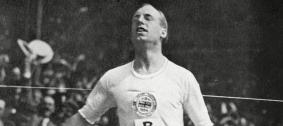After refusing to run in the heats on a Sunday, for his favoured distance, the men's 100 metres, Liddell could still compete in the men's 400 metres at the 1924 Summer Olympics in Paris, which he won.
The British educated athlete who was nicknamed 'the flying Scotsman' and born in Tianjin, returned to China in 1925 to serve as a missionary teacher, where he mostly remained until his death in 1945, in a Japanese civilian internment camp.
On Monday, the marble sculpture of Liddell, captured in mid-stride, was unveiled in Tianjin, coincidentally the scene of two deadly explosions last week.
The statue was revealed in front of his daughters, the internment camp's remaining survivors and the actor Joseph Fiennes, who is due to play to play him in The Last Race, which has just finished filming in China.
Liddell's Olympic training and racing, and the religious convictions that influenced him, were first depicted in the Oscar-winning 1981 film Chariots of Fire, in which he is portrayed by fellow Scot Ian Charleson.
"It's one thing to preach Bible study or whatever, but it's another to actually live your beliefs under conditions like being in an internment camp," said Fiennes at Monday's unveiling.
"It's not just preaching, it's about watching someone in a set of beliefs in extraordinary circumstances, still believing those beliefs will carry him through," added Fiennes.
Liddell, who also played rugby for Scotland, took risks by smuggling medical supplies through the barbed wire to try to treat the 2,000 other citizens of Allied countries imprisoned with him. Survivors say that he dedicated himself tirelessly to breaking down cliques and educating internees, mirroring his earlier work as a teacher in Tianjin.
His wife left China for Canada in 1941 with the couple's daughters while she was expecting their third child, Maureen.
Patricia Liddell, 80, admitted at the unveiling that as a child she could not understand her father's decision not to join them, and came to reconcile herself with his decision only in later life.
"I remember travelling in a rickshaw with him, I remember having fun with him," she said. "Then we didn't have him during the war and we used to think: 'Oh, why aren't you with us?' It was years later when we met people who were the children in the camp that we understood there was a reason he did it."
She was not to see her father again, because Liddell died in the camp from a brain tumour in February 1945. His remains lie beside his new statue, his headstone carved from Scottish granite.
"I find it extraordinary that a statue has been raised - the Chinese don't really raise statues, maybe just for Mao Zedong."
"My father was multi-faceted, he didn't just appeal to religious people. He was born in China, he worked in China, he died in China. He's their Olympic hero. He didn't leave the Chinese people when the going got tough."




